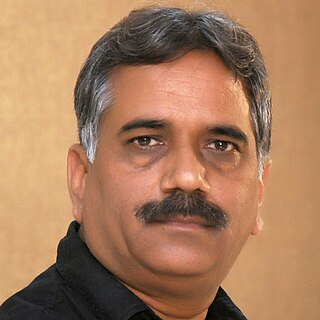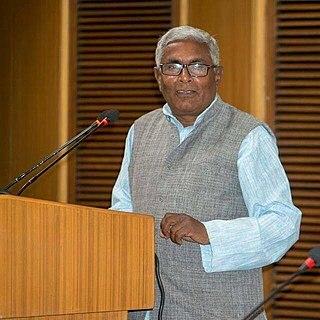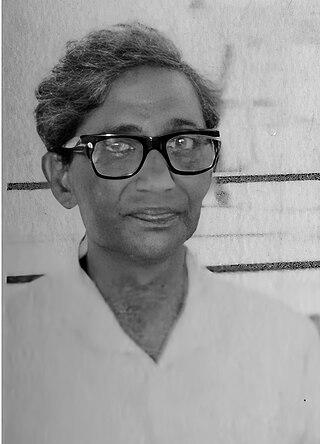Harishankar Parsai was an Indian writer who wrote in Hindi. He was a noted satirist and humorist of modern Hindi literature and is known for his simple and direct style. He wrote vyangya (satire), which described human values and nature. They reflected his critical thinking and humorous way of describing simple things with huge meanings. Parsai won the Sahitya Akademi Award in 1982, for his satire, Viklaang Shraddha ka daur.

Pandit Makhanlal Chaturvedi, also called Pandit ji, was an Indian poet, writer, essayist, playwright and a journalist who is particularly remembered for his participation in India's national struggle for independence and his contribution to Chhayavaad, the Neo-romanticism movement of Hindi literature. He was awarded the first Sahitya Akademi Award in Hindi for his work Him Tarangini in 1955. The Government of India awarded him the civilian honour of the Padma Bhushan in 1963. For his works reinforcing Indian nationalism during the British Raj, he is referred to as the Yug Charan.
Indra Bahadur Khare was an Indian Hindi-language poet, a participant in Kavi-Sammelan, and a professor of 20th century Hindi literature.

Kunwar Bechain was a Hindi poet of India. He was a resident of Ghaziabad, Uttar Pradesh.

Hari Joshi is a Hindi writer, satirist, novelist and poet.

Suryakumar Pandey is an Indian poet, humorist, satirist and writer. During his literary career, Pandey has contributed to various genres of Hindi literature including Hasya Kavita, Vyangya (satire) and Bal Kavita etc... He is most recognized as a Hasya kavi and for his distinctive style and language of hasya kavita Popularly known as Pandeyji, he is also well known for his Hāsya kavita recitations at Hindi kavi sammelans both in India and globally.
Neelabh Ashk was an Indian Hindi language poet, journalist, and translator. He published various poetry collections. He is best known for translating the works of notable authors like Arundhati Roy, Salman Rushdie, William Shakespeare, Bertolt Brecht, and Mikhail Lermontov.
Koduram Dalit was an Indian poet in Hindi and Chhattisgarhi languages.

Pawan Karan is an Indian poet, columnist, editor, social and political analyst and “one of the major poets of early 21st century”.He is highly regarded for his realistic depiction of women's life in Indian society. Apart that his poems written against subjects like imperialism, capitalism, religion fanatics, social beliefs of caste based society and orthodox customs are highly appreciated as well, because of them he constantly becomes a target of religious fanatics, orthodox social view and politics and long-established norms of Indian society.
Doodhnath Singh was an Indian Hindi language writer, critic and poet. Born in Ballia district of Uttar Pradesh, Singh studied Hindi at the University of Allahabad and served as a Professor there until 1994. In 2014, the government of Uttar Pradesh honoured him with their Bharat Bharti Samman.

Sonroopa Vishal is Indian writer, poet and author, who writes in the Hindi language. The State Government of Uttar Pradesh awarded her with the Harivansh Rai Bachchan Navodit Geetkaar Award in 2015 and Jagadish Gupta Sarjana Award in 2019. Sonroopa Vishal has published three books, including Likhna Zaruri Hai (2014) and America Aur 45 Din (2018), and co-authored several books.

Jagdish Piyush was an Indian Hindi writer, a leader of the Indian National Congress and Educationist from Amethi, Uttar Pradesh, India. He was also the media representative of former prime minister Shri Rajiv Gandhi and in 1984, he also gave the slogan of Amethi Ka Danka, Bitiya Priyanka.

Aalok Shrivastav is an Indian poet, lyricist and journalist. His critically acclaimed works include Aameen (2007), a poetry collection and Afreen (2012), a story collection, both published by Rajkamal Prakashan. Aalok's works have won a number of accolades for his works, including the International Pushkin Award and Dushyant Kumar Award by Madhya Pradesh Sahitya Akademi.
Shambhu Shikhar is an Indian Comedian, Poet, and writer from Madhubani, Bihar, India. He was the semi-finalist of the Great Indian Laughter Challenge -III aired on StarPlus in 2007. He was awarded with Bharatendyu Harishchand Puraskar by the Hindi Academy, Government of Delhi in 2010.
"I'm a Charan of Immortal Martyrs" is a poem written in Hindi by Srikrishna Saral.
Shri Krishna Saral was an Indian poet and writer. Most of his works are about Indian revolutionaries, 15 of which are mahakavyas (epics). He is hailed as a 'Yug-Charan' for his nationalist poetry reminiscent of the sacrificial traditions of Indian soldiers. "Mai Amar Shahido ka Charan" composed by him is a very popular Hindi language poem.
Haridas Kesaria or Haridas Mahiyaria was a 16th-century Mewar chieftain, warrior and poet from Rajasthan. In the Battle of Gagron in 1519, he fought alongside the Mewar army led by Rana Sanga, capturing and imprisoning the Sultan Mahmud Khalji II of Malwa, thus quickly ending the war. He was a close friend of Rana Sanga, participating in many battles and campaigns of Mewar kingdom. He fought as a commander in many battles including Battle of Khatoli, Battle of Gagron, Battle of Dholpur, Rana Sanga's invasion of Gujarat, Battle of Bayana and Battle of Khanwa in which he sacrificed his life on the battlefield while defending Rana Sanga.
Laxmi Narayan Sudhanshu (1906–1974) was an Indian writer, litterateur, poet, independent activist and political leader. He won the 1952 Bihar Legislative Assembly election from an assembly seat in Purnia. He also held the post of Speaker of the Bihar Legislative Assembly from 1962 to 1967. Sudhanshu is known for actively participating in the Quit India Movement in 1942. He was imprisoned in Bhagalpur jail by the Britishers.

Mahendra Pratap Singh was an Indian Hindi author, historian and researcher. He wrote and published books in history, Hindi literaturem, and poetry.

Chandrarekha Dhadwal is a writer from Himachal Pradesh, India. She is noted for her short stories, poems, novels, and ghazals in Hindi and Pahadi.










